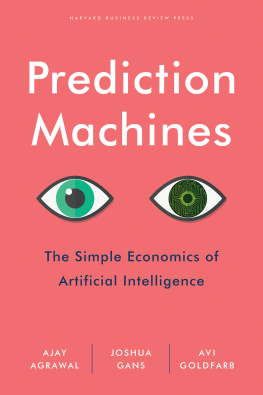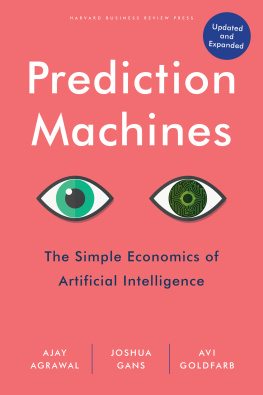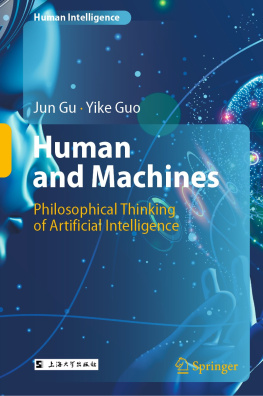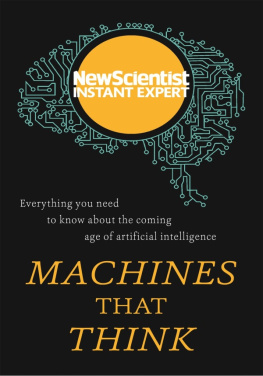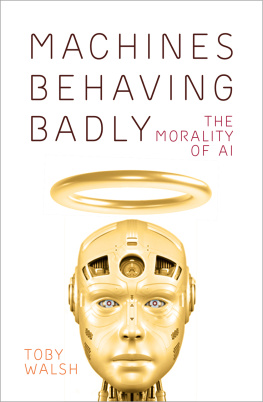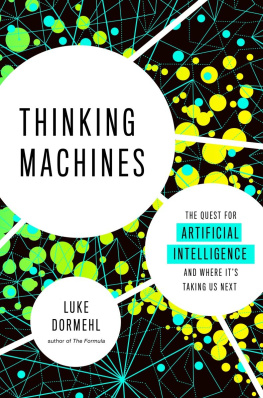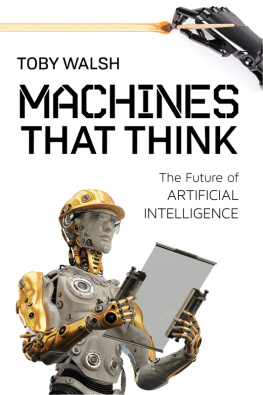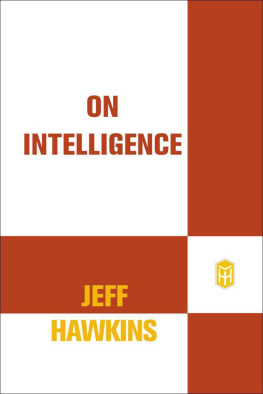AI is the most transformative technology of our era. Agrawal, Gans, and Goldfarb not only understand its essence but also deliver deep insights into its economic implications and intrinsic trade-offs. If you want to clear the fog of AI hype and see clearly the core of AIs challenges and opportunities for society, your first step should be to read this book.
ERIK BRYNJOLFSSON, MIT professor; author, The Second Machine Age and Machine, Platform, Crowd
Prediction Machines is a must-read for business leaders, policy makers, economists, strategists, and anyone who wants to understand the implications of AI for designing business strategies, decisions, and how AI will have an impact on our society.
RUSLAN SALAKHUTDINOV, Carnegie Mellon professor; Director of AI Research, Apple
I encounter so many people who feel excited but overwhelmed by AI. This book will ground those feeling lost by giving them a practical framework.
SHIVON ZILIS, OpenAI Director and Partner, Bloomberg Beta
The current AI revolution will likely result in abundance, but the process of getting there requires deliberation on tough topics that include increasing unemployment and income disparity. This book presents frameworks that allow decision makers to deeply understand the forces at play.
VINOD KHOSLA, Khosla Ventures; founding CEO, Sun Microsystems
What does AI mean for your business? Read this book to find out.
HAL VARIAN, Chief Economist, Google
AI may transform your life. And Prediction Machines will transform your understanding of AI. This is the best book yet on what may be the best technology that has come along.
LAWRENCE H. SUMMERS, Charles W. Eliot Professor, former president, Harvard University; former secretary, US Treasury; and former chief economist, World Bank
Prediction Machines is a path-breaking book that focuses on what strategists and managers really need to know about the AI revolution. Taking a grounded, realistic perspective on the technology, the book uses principles of economics and strategy to understand how firms, industries, and management will be transformed by AI.
SUSAN ATHEY, Economics of Technology Professor, Stanford University; former consulting researcher, Microsoft Research New England
Prediction Machines achieves a feat as welcome as it is unique: a crisp, readable survey of where artificial intelligence is taking us separates hype from reality, while delivering a steady stream of fresh insights. It speaks in a language that top executives and policy makers will understand. Every leader needs to read this book.
DOMINIC BARTON, Global Managing Partner, McKinsey & Company
This book makes artificial intelligence easier to understand by recasting it as a new, cheap commoditypredictions. Its a brilliant move. I found the book incredibly useful.
KEVIN KELLY, founding executive editor, Wired ; author, What Technology Wants and The Inevitable

Copyright
HBR Press Quantity Sales Discounts
Harvard Business Review Press titles are available at significant quantity discounts when purchased in bulk for client gifts, sales promotions, and premiums. Special editions, including books with corporate logos, customized covers, and letters from the company or CEO printed in the front matter, as well as excerpts of existing books, can also be created in large quantities for special needs.
For details and discount information for both print and ebook formats, contact .
Copyright 2018 Ajay Agrawal, Joshua Gans, Avi Goldfarb
All rights reserved
No part of this publication may be reproduced, stored in or introduced into a retrieval system, or transmitted, in any form, or by any means (electronic, mechanical, photocopying, recording, or otherwise), without the prior permission of the publisher. Requests for permission should be directed to permissions@hbsp.harvard.edu, or mailed to Permissions, Harvard Business School Publishing, 60 Harvard Way, Boston, Massachusetts 02163.
First eBook Edition: Apr 2018
ISBN: 978-1-63369-567-2
eISBN: 978-1-63369-568-9
To our families, colleagues, students, and startups who inspired us to think clearly and deeply about artificial intelligence.
Contents
Acknowledgments
We express our thanks to the people who contributed to this book with their time, ideas, and patience. In particular, we thank Abe Heifets of Atomwise, Liran Belanzon of BenchSci, Alex Shevchenko of Grammarly, Marc Ossip, and Ben Edelman for the time they spent with us in interviews, as well as Kevin Bryan for his comments on the overall manuscript. Also, we thank our colleagues for discussions and feedback, including Nick Adams, Umair Akeel, Susan Athey, Naresh Bangia, Nick Beim, Dennis Bennie, James Bergstra, Dror Berman, Vincent Brub, Jim Bessen, Scott Bonham, Erik Brynjolfsson, Andy Burgess, Elizabeth Caley, Peter Carrescia, Iain Cockburn, Christian Catalini, James Cham, Nicolas Chapados, Tyson Clark, Paul Cubbon, Zavain Dar, Sally Daub, Dan Debow, Ron Dembo, Helene Desmarais, JP Dube, Candice Faktor, Haig Farris, Chen Fong, Ash Fontana, John Francis, April Franco, Suzanne Gildert, Anindya Ghose, Ron Glozman, Ben Goertzel, Shane Greenstein, Kanu Gulati, John Harris, Deepak Hegde, Rebecca Henderson, Geoff Hinton, Tim Hodgson, Michael Hyatt, Richard Hyatt, Ben Jones, Chad Jones, Steve Jurvetson, Satish Kanwar, Danny Kahneman, John Kelleher, Moe Kermani, Vinod Khosla, Karin Klein, Darrell Kopke, Johann Koss, Katya Kudashkina, Michael Kuhlmann, Tony Lacavera, Allen Lau, Eva Lau, Yann LeCun, Mara Lederman, Lisha Li, Ted Livingston, Jevon MacDonald, Rupam Mahmood, Chris Matys, Kristina McElheran, John McHale, Sanjog Misra, Matt Mitchell, Sanjay Mittal, Ash Munshi, Michael Murchison, Ken Nickerson, Olivia Norton, Alex Oettl, David Ossip, Barney Pell, Andrea Prat, Tomi Poutanen, Marzio Pozzuoli, Lally Rementilla, Geordie Rose, Maryanna Saenko, Russ Salakhutdinov, Reza Satchu, Michael Serbinis, Ashmeet Sidana, Micah Siegel, Dilip Soman, John Stackhouse, Scott Stern, Ted Sum, Rich Sutton, Steve Tadelis, Shahram Tafazoli, Graham Taylor, Florenta Teodoridis, Richard Titus, Dan Trefler, Catherine Tucker, William Tunstall-Pedoe, Stephan Uhrenbacher, Cliff van der Linden, Miguel Villas-Boas, Neil Wainwright, Boris Wertz, Dan Wilson, Peter Wittek, Alexander Wong, Shelley Zhuang, and Shivon Zilis. We also thank Carl Shapiro and Hal Varian for their book Information Rules , which served as a source of inspiration for our project. The Creative Destruction Lab and Rotman School staffs have been fantastic, particularly Steve Arenburg, Dawn Bloomfield, Rachel Harris, Jennifer Hildebrandt, Anne Hilton, Justyna Jonca, Aidan Kehoe, Khalid Kurji, Mary Lyne, Ken McGuffin, Shray Mehra, Daniel Mulet, Jennifer OHare, Gregory Ray, Amir Sariri, Sonia Sennik, Kristjan Sigurdson, Pearl Sullivan, Evelyn Thomasos, and the rest of the Lab team and Rotman staff. We thank our dean, Tiff Macklem, for his enthusiastic support of our work on AI at the Creative Destruction Lab and throughout the Rotman School. Thanks also to the leadership and staff at The Next 36 and The Next AI. We also thank Walter Frick and Tim Sullivan for stellar editing, as well as our agent, Jim Levine. Many of the ideas in the book build on research supported by the Social Sciences and Humanities Research Council of Canada, the Vector Institute, the Canadian Institute for Advanced Research under the leadership of Alan Bernstein and Rebecca Finlay, and the Sloan Foundation with Danny Goroffs support under the Economics of Digitization grant, managed by Shane Greenstein, Scott Stern, and Josh Lerner. We are grateful for their support. We also thank Jim Poterba for his support of our conference on the economics of AI through the National Bureau of Economic Research. Finally, we thank our families for their patience and contributions during this process: Gina, Amelia, Andreas, Rachel, Anna, Sam, Ben, Natalie, Belanna, Ariel, Annika.

